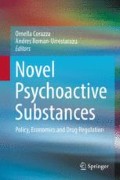Abstract
This work focuses on the lessons of efforts to internationalise prohibitions and regulation over the last century and what these mean for contemporary control efforts around novel psychoactive substances (NPS). In particular it will focus on the system of ‘scheduling’ and how it might be affected by the rapid emergence of NPS. The former was designed as a reactive system of commodity regulation, where the key substances had medical use and therefore required a global trading arranging to minimise the negative externalities from their production and use. It examines the key tenets of the global regulatory system and how they emerged in response to perceived key global issues and the emergence of new narcotic and psychotropic substances. It thereby seeks to determine the continued relevance of the global drug regulatory system to the issue of NPS and how it may evolve in response to the rapid proliferation of these substances. Ultimately, it concludes that the NPS phenomenon will merely accelerate shifts already underway within the system, towards a greater role for national regulatory decisions, an expansion of regulatory experimentation and options and a more general recourse to the principle of ‘policy pluralism’.
Access this chapter
Tax calculation will be finalised at checkout
Purchases are for personal use only
Notes
- 1.
This was not the case for Group II since the PCOB only received yearly statistics, and it was only for that year the PCOB was authorised to impose an embargo.
- 2.
“A medicine prepared by extracting one or more active constituents of a plant” (http://www.merriam-webster.com/dictionary/galenical).
References
Bewley-Taylor DR (2012) International drug control: consensus fractured. Cambridge University Press, Cambridge
Brownfield WR (2014) Trends in global drug policy. New York City, October 9, 2014. http://fpc.state.gov/232813.htm
Collins J (2014) The economics of a new global strategy. In: Collins J (ed) Ending the drug wars: report of the LSE expert group on the economics of drug policy. LSE IDEAS, London
Collins J (2015) Regulations and prohibitions: Anglo-American relations and international drug control, 1939–1964. London School of Economics and Political Science (LSE), London
Collins J (2017) Rethinking “flexibilities” in the international drug control system – potential, precedents and models for reforms. Int J Drug Policy, in press
Convention on Psychotropic Substances of 1971 (1971) United Nations, New York
EMCDDA (2015) New psychoactive substances in Europe: an update from the EU Early Warning System, Lisbon
Gayle D (2015) Psychoactive substances ban will “end brain research” in Britain, experts warn. The Guardian. https://www.theguardian.com/politics/2015/may/29/psychoactive-substances-ban-end-brain-research-britain-david-nutt. Accessed 17 Mar 2017
Gimenez Corte C (2010) The forms of international institutional law: an historical analysis of the scheduling decisions of narcotic drugs and psychotropic substances taken by the United Nations’ commission on narcotics drugs. Int Organ Law Rev 7:171–221. doi:10.1163/157237310X523786
Kleiman MAR, Ziskind JA (2014) Lawful access to cannabis: gains, losses and design criteria. In: Collins J (ed) Ending the drug wars: report of the LSE expert group on the economics of drug policy. The London School of Economics and Political Science, London
McAllister WB (2004) The global political economy of scheduling: the international–historical context of the controlled substances act. Drug Alcohol Depend 76:3–8. doi:10.1016/j.drugalcdep.2004.02.012
McAllister WB (2012) Reflections on a century of international drug control. Gov Glob Drug Wars, LSE IDEAS special reports 10–16
Meyer K, Parssinen TM (2002) Webs of smoke: smugglers, warlords, spies, and the history of the international drug trade. Rowman & Littlefield, Oxford
Mills JH (2014) Cocaine and the British empire: the drug and the diplomats at the Hague opium conference, 1911–12. J Imp Commonw Hist 42:400–419
Single Convention on Narcotic Drugs of 1961 as amended by the 1972 Protocol (1961) United Nations, New York
Spillane J, Mcallister WB (2003) Keeping the lid on: a century of drug regulation and control. Drug Alcohol Depend 70:S5–S12. doi:10.1016/S0376-8716(03)00096-6
Taylor AH (1969) American diplomacy and the narcotics traffic, 1900–1939: a study in international humanitarian reform. Duke University Press, Durham, NC
Thoumi FE (2016) Re-examining the “medical and scientific” basis for interpreting the drug treaties: does the “regime” have any clothes? In: Collins J (ed) After the drug wars: report of the LSE expert group on the economics of drug policy. LSE IDEAS, London
United Nations (1973) Commentary on the single convention on narcotic drugs, 1961. United Nations Secretariat, New York
United Nations (1976) Commentary on the convention on psychotropic substances, 1971. United Nations, New York
United Nations (1998) Commentary on the United Nations convention against illicit traffic in narcotic drugs and psychotropic substances 1988. United Nations, New York
United Nations Convention Against Illicit Traffic in Narcotic Drugs and Psychotropic Substances (1988) United Nations, Vienna
UNODC (2008) A century of international drug control. United Nations, Vienna
WHO Expert Committee on Drug Dependence (1968) Sixteenth report (no. 407), WHO technical report series. WHO
WHO Expert Committee on Drug Dependence (n.d.) Seventeenth report, WHO technical report series
Author information
Authors and Affiliations
Corresponding author
Editor information
Editors and Affiliations
Rights and permissions
Copyright information
© 2017 Springer International Publishing AG
About this chapter
Cite this chapter
Collins, J. (2017). Regulation as Global Drug Governance: How New Is the NPS Phenomenon?. In: Corazza, O., Roman-Urrestarazu, A. (eds) Novel Psychoactive Substances. Springer, Cham. https://doi.org/10.1007/978-3-319-60600-2_3
Download citation
DOI: https://doi.org/10.1007/978-3-319-60600-2_3
Published:
Publisher Name: Springer, Cham
Print ISBN: 978-3-319-60599-9
Online ISBN: 978-3-319-60600-2
eBook Packages: MedicineMedicine (R0)

